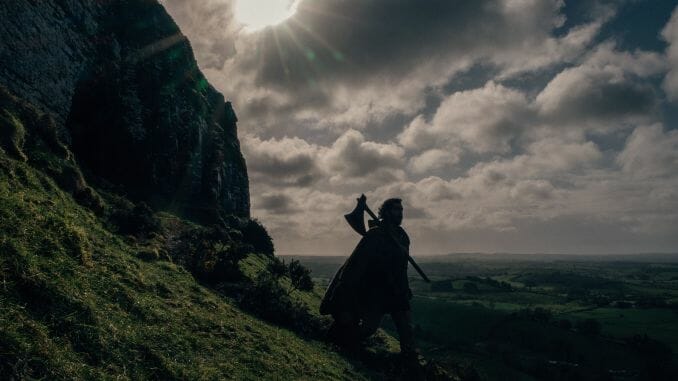David Lowery’s Excellent The Green Knight Knows the World Only Ever Ends for Us

When Sir Gawain departs Camelot, he rides past a scene of desolation. A once-prosperous forest stripped of its lush greenery by human hands, only splintered wood and dust remain. Through his journey, Gawain (Dev Patel) is greeted by similar, if not entirely equal imagery, constantly evocative of mankind’s awkward, unwanted presence within the natural world. One year prior, the Green Knight (Ralph Ineson) approached King Arthur (Sean Harris) and his Knights of the Round Table, conjured up by Gawain’s mother, Morgan Le Fay (Sarita Choudhury), seeking a participant for his Christmas Game. Should one of Arthur’s knights land a blow against him, the knight shall receive his mighty axe, but must seek him out exactly one year later to receive an equal blow in return. When Gawain, reluctant to accept though eager to bring honor to his name, agrees to the Green Knight’s terms, the humanoid creature only drops his axe and lowers his head to reveal an oaken neck, offering it to Gawain freely. Naturally, Gawain succeeds, but at what cost? The Green Knight retrieves his head and rides off into the night. Gawain understands he cannot do the same. Foliage sprouts in the stone cracks on the hall floor where the Green Knight’s blood has been spilt.
David Lowery’s The Green Knight is a modern reckoning with a medieval fable. It’s a haunting, confounding, surprisingly erotic fantasy epic; a confrontation between man and nature, nature and religion, man and himself. Adapted from the anonymously authored Arthurian poem Sir Gawain and the Green Knight, Lowery’s austere yet spellbinding take on the simple 14th century legend evokes the same questions as the original work, interrogating the cost of one’s life for the sake of one’s honor when there is only certainty that they will die. “Greatness? Why is goodness not enough?” pleads Esel (Alicia Vikander), Gawain’s lover, a sex worker, whom he holds at arm’s length. But the film and Gawain’s quest carry a message that stretches far beyond the fantastical world of King Arthur, one about humanity’s inherent frailty in the face of far-reaching environmental destruction and what gods they have foolishly chosen in place of nature. As Gawain prepares to meet his friendly opponent, he arms himself with his mother’s enchanted belt, while his shield—adorned with biblical imagery—is blessed by a priest with prayer and holy water to protect him on the journey ahead. It reads as overwhelmingly ironic, and very nearly funny. An ultimately meaningless act that is no match against an adversary which obeys no master.
Gawain is tasked with a six-day journey to a place called the Green Chapel, where the Green Knight allegedly sits awaiting the arrival of King Arthur’s young nephew to meet his challenge. But as is any epic quest, Gawain’s is one fraught with a series of obstacles, dreamlike setpieces which seem to operate somewhere between sleep and waking. The sprawling mountains, rolling hills and dense gloom are rivetingly captured by cinematographer Andrew Droz Palermo, as Gawain wades through murky, rippling waters, tumbles down sloping foliage or bathes in moonlight so textured it could have been hand-painted in acrylics. Palermo is further aided by the natural splendor of Ireland’s landscapes, rendering it as difficult to discern what’s physical scenery or special effects trickery (or both) as it is to untangle the cryptic circumstances of Gawain’s journey. In a clearing, he encounters an unkempt young man (Barry Keoghan, truly natural at playing a dirty little trickster), who claims to have lost family in battle—a bit too keen to assist Gawain in directing passage towards the Green Chapel. Later, Gawain seeks shelter at a seemingly abandoned cottage, whose inhabitant, Winifred (Erin Kellyman) eventually returns with an eerie request.
-

-

-

-

-

-

-

-

-

-

-

-

-

-

-

-

-

-

-

-

-

-

-

-

-

-

-

-

-

-

-

-

-

-

-

-

-

-

-

-








































